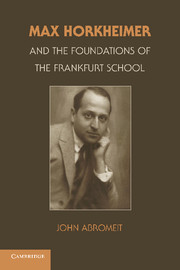Book contents
- Frontmatter
- Contents
- Acknowledgments
- A Note on References and Permissions
- Introduction
- 1 Coming of Age in Wilhelmine Germany
- 2 Student Years in Frankfurt
- 3 A Materialist Interpretation of the History of Modern Philosophy
- 4 The Beginnings of a Critical Theory of Contemporary Society
- 5 Horkheimer’s Integration of Psychoanalysis into His Theory of Contemporary Society
- 6 Horkheimer’s Concept of Materialism in the Early 1930s
- 7 The Anthropology of the Bourgeois Epoch
- 8 Reflections on Dialectical Logic in the Mid-1930s
- Excursus I The Theoretical Foundations of Horkheimer’s Split with Erich Fromm in the Late 1930s
- Excursus II Divergence, Estrangement, and Gradual Rapprochement
- 9 State Capitalism – The End of Horkheimer’s Early Critical Theory
- Epilogue
- Selected Bibliography
- Index
- References
5 - Horkheimer’s Integration of Psychoanalysis into His Theory of Contemporary Society
Published online by Cambridge University Press: 05 June 2012
- Frontmatter
- Contents
- Acknowledgments
- A Note on References and Permissions
- Introduction
- 1 Coming of Age in Wilhelmine Germany
- 2 Student Years in Frankfurt
- 3 A Materialist Interpretation of the History of Modern Philosophy
- 4 The Beginnings of a Critical Theory of Contemporary Society
- 5 Horkheimer’s Integration of Psychoanalysis into His Theory of Contemporary Society
- 6 Horkheimer’s Concept of Materialism in the Early 1930s
- 7 The Anthropology of the Bourgeois Epoch
- 8 Reflections on Dialectical Logic in the Mid-1930s
- Excursus I The Theoretical Foundations of Horkheimer’s Split with Erich Fromm in the Late 1930s
- Excursus II Divergence, Estrangement, and Gradual Rapprochement
- 9 State Capitalism – The End of Horkheimer’s Early Critical Theory
- Epilogue
- Selected Bibliography
- Index
- References
Summary
As the final step in our examination of the development of Critical Theory in Horkheimer’s thought in the late 1920s, we turn now to his appropriation of psychoanalysis. In order to understand this process, it is necessary to reconstruct, at least briefly, the historical and biographical, as well as the theoretical, context in which it occurred. This will entail an examination not only of the principal protagonists, Horkheimer and Erich Fromm, but also the important supporting roles played by Leo Lowenthal, Frieda Fromm-Reichmann, and Karl Landauer. It will also be necessary to retrace certain key developments at the Institute for Social Research in late 1920s as well as the founding of the Frankfurt Psychoanalytic Institute in February 1929. One should be forewarned, however, that it is no longer possible to reconstruct the biographical and historical context in any great detail or with absolute certainty, because the vast majority of sources upon which such a reconstruction would be based have been lost or destroyed. One cannot, in other words, avoid a certain amount of conjecture at the biographical and historical level. However, when combined with an analysis of Horkheimer’s and Fromm’s theoretical development from this time, a relatively clear picture emerges of the integration of psychoanalysis into Critical Theory. Toward this end, we will cast a quick glance back at Horkheimer’s move from Gestalt psychology to psychoanalysis in the late 1920s, and also answer the question of why Theodor Adorno’s interpretation of psychoanalysis in his first Habilitationsschrift (submitted in 1927) failed to capture Horkheimer’s attention at that time. We will then proceed to an examination of Fromm’s theoretical trajectory in the late 1920s, including the influence of his colleagues, such as Siegfried Bernfeld, from the Berlin Psychoanalytic Institute. Finally, we will examine the empirical study of the attitudes of German workers that Horkheimer and Erich Fromm began in 1929. The study represents a decisive moment, not only in Horkheimer’s integration of psychoanalysis, but also in the development of Critical Theory as a whole, insofar as it was the first time that both were applied to a concrete social problem. Although Fromm officially directed the study, a closer examination of the conditions in which it was conceptualized and carried out leaves no doubt that it was the first concrete attempt to put Horkheimer’s nascent program of Critical Theory to the test. The undogmatic Marxist theoretical hypotheses and the emphasis on empirical research that informed the study as a whole were largely attributable to Horkheimer, whereas the implementation of psychoanalytic methods in the formulation of survey questions and the analysis of responses to them were Fromm’s primary contribution. The study was the first product of a fruitful collaboration between Fromm and Horkheimer and would play a crucial role in the further development of both Horkheimer’s own thought and Critical Theory as a whole.
- Type
- Chapter
- Information
- Max Horkheimer and the Foundations of the Frankfurt School , pp. 185 - 226Publisher: Cambridge University PressPrint publication year: 2011



